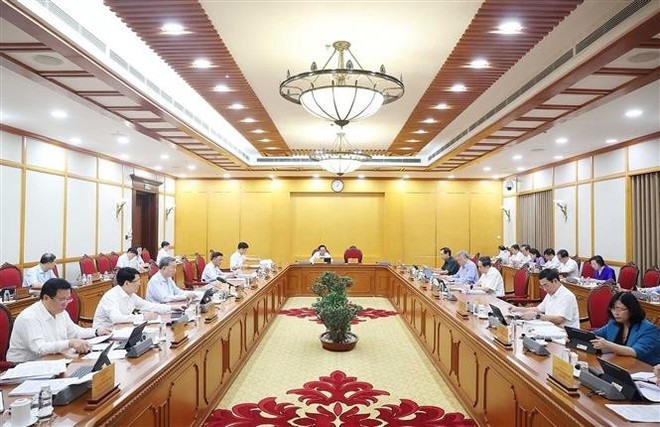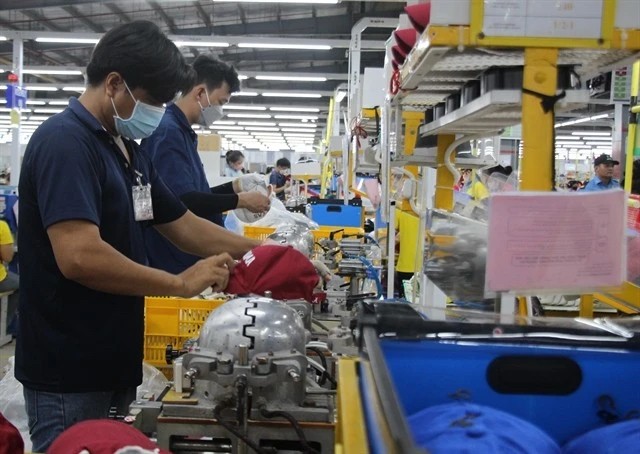Vietnam to contribute to building the International Convention on fighting violence and harassment in the world of work
(VNF) – Gender-based violence and harassment in the world of work has recently draw the attention of Vietnam and many countries in the world, due to its negative impact on productivity, dignity, mental and physical health of the workers. In that context, the International Labours Organization (ILO) is pushing forward the process of building an International Convention on Ending Violence and Harassment against Women and Men in the World of Work (the Convention).
| |
Head of Department of International Cooperation, Nguyen Manh Cuong speaks at the meeting (photo: Phi Yen)
In June this year, the tripartite delegation from the Vietnamese government, workers and employers will attend the 107th annual Session of the ILO in Geneva, Switzerland. During the event, the Vietnamese delegates will participate in the second discussion round about the Convention.
Recently, on May 10th, a workshop co-organised by the Ministry of Labour, the Invalids and Social Affairs (MOLISA) and CARE International in Vietnam was held in Hanoi to update relevant parties on the context and progress of the Convention and assess the possibility for Vietnam to join the Convention,
“Ensuring a safe working environment does not only enhance economic effectiveness but also improve workers’ well-being and protect their right to be free from violence. As an organisation pioneering in and having long term commitments to ending violence and harassment, CARE hopes that Vietnam will have significant contributions to the process of developing the Convention and improve domestic legal regulations towards ending violence and harassment in the world of work,” said Le Kim Dung, Country Director, CARE International in Vietnam.
She also noted that gender-based violence and harassment in the world of work has been persisting, causing numerous harms to the society and the economy.
According to Dung, nowadays, gender-based violence and harassment have people of all genders, not only women and girls. However, she also stressed that those cases against women and girls are still dominant.
According to a survey conducted by the European Union Agency for Fundamental Rights in 2014, "forty-three per cent of women in the 28 European Union Member States have experienced some form of psychological violence by an intimate partner in their lifetime."
Meanwhile, a research by the Inter-Parliamentary Union in 2016 showed that "Eighty-two per cent of women parliamentarians who participated in a study conducted by the Inter-parliamentary Union in 39 countries across 5 regions reported having experienced some form of psychological violence while serving their terms."
In US, over 50% female workers have been sexually harassed, whereas in Germany, 6 out of 10 nurses were victims of this act, according to a research by Srivastava, published on the Harvard International Law Journal in August, 2010.
In China, according to the Women’s Watch China (2009), twenty percent women are sexually harassed in the workplace.'
Meanwhile, in South East Asia, sexual harassment has direct impact on the economy. A research conducted by CARE Australia in 2017 on 1,287 people (both men and women) across 52 garment factories, suggests that the indirect costs of sexual harassment through reduced productivity, revenue loss, and missed days of work add up to an estimated USD $89 million per year.
| |
Le Kim Dung, Country Director, CARE International in Vietnam speaks at the conference (photo: Phi Yen)
In Vietnam, according to CARE and some law firms, sexual harassment is a reality exerting harmful effects on the well-being and workers’ stable source of earning for living. The employers also suffer from the consequence of sexual harassment and gender-based violence: it leads to the increase of absence or resignation which causes productivity reduction, profit decline,Even when the harassed staff tries to go to work like normal to maintain their income, they still fail to fully concentrate on the work.
However, recent researches only mentioned the definition, the types of harassment and gender-based violence, the offenders, without providing official statistical data on the rate of those cases in the world of work.
According to Nguyen Thi Hien, a specialist of the Research Center on Female Workers and Genders, Institute of Social and Labour Science, MoLISA, Vietnam still lacks of research on this issue.
Meanwhile, labourers at any level can become victims of harassment and gender-based violence, which is a sensitive issue, since there is a relation between career benefit with the victims. The majority of sexual harassment are females, who are also subordinates, under the control of the offenders.
| |
Nguyen Van Binh (second, right),Vice Head of the Department of Legal and Compliance, MoLISA speaks at the roundtable discussion (photo: Phi Yen)
In this context, participating in discussion on building the Convention is a precious opportunity to raise society’s awareness of a world’s problem in general, and of Vietnam in particular.
The participation is highly beneficial for Vietnam when the country is preparing for the adjustment of the Labour Law, and the Convention’s contents can be used as reference, said Nguyen Manh Cuong, Head of the International Cooperation Department, MoLISA.
The draft convention covers 5 aspects, which are : Gender-based violence, Integrated approach, Prevention, Protection, Support and guidance.
According to the draft of the new Convention, several items will be added, to ensure protecting the maximum right of workers of working in a safe, healthy, fair environment.
For instance, in the draft of the Convention workers and employers are re-defined. (workers: persons in all sectors, both in the formal and informal economy, and whether in urban or rural areas; employers: any person or entity that engages workers either directly or indirectly).
According to Andrea Prince, specialist on Labour Law (ILO in Vietnam), via participating in the second round of the discussion, Vietnamese voice will not only contribute to protecting the rights of labourer in Vietnam but also those worldwide.
According to Nguyen Van Binh, Vice Head of the Department of Legal and Compliance, MoliSA, there are various compatible views in the current Vietnamese Labour Law and the draft of the Convention.
For instance, item c, article 37, allows labourers to terminate the contract, if they suffer from violence, sexual harassment, being forced to work, which is quite similar to the Convention draft, allowing the workers to withdraw from works which put their health and life at risk.
Or the Article 181 takes account of the group of domestic helpers, who are at the highest risk of being harassed and violence. This view is similar to the recommendation by ILO in the draft of the Convention.
According to Binh, if the international legal instrument like the Convention is ratified and enacted, it will create a positive effect for member countries, since it will inspire policy makers to pay more attention to this issue and can be used as a reference for each country to create their own legal instrument, which suits their own situations and needs.
However, there are still certain limitations in the Vietnamese legal systems in fighting gender-based violence and harassment in the world of work, including: vague definition of gender-based violence and harassment act; lack of detailed instruction on claiming, prosecution process; lack of proper criminal, civil punishment, etc.
Those are the difficulties facing not only Vietnam but also many countries, which must be coped with by inpidual country’s effors, not ILO, Binh said.
In addition, he stressed that in order to drastically eradicate harassment and gender-based violence in the world of work, the awareness and action of stakeholders like employees, enterprises, trade union is the decisive factor./.
( Translated by Phi Yen )
Recommended
 National
National
Vietnam News Today (Jun. 7): Prime Minister works with Estonian firms to accelerate projects in Vietnam
 National
National
Vietnam News Today (Jun. 6): Foreign Investment in Vietnam Surges in Five Months
 National
National
Vietnam News Today (Jun. 5): PM sets off for attendance at UNOC 3 in France, official visits to Estonia, Sweden
 National
National
Vietnam News Today (Jun. 4): Vietnam - Promising Candidate for Southeast Asia’s Next Powerhouse
Popular article
 National
National
Shangri-La Dialogue 22: Vietnam Highlights Some Issues of Ensuring Stability in a Competitive World
 National
National
Vietnam News Today (Jun. 3): PM Pham Minh Chinh to Attend UN Ocean Conference, Visit Estonia, Sweden
 National
National
Vietnam News Today (Jun. 2): Vietnamese Trade Mission Sounds Out Business Opportunities in United States
 National
National



